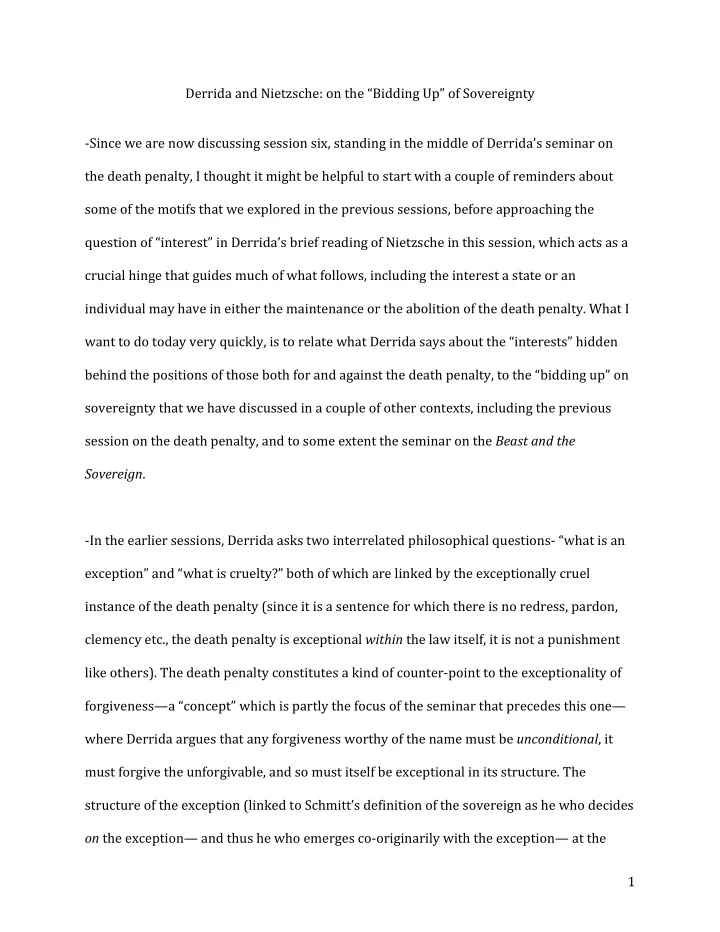

Derrida ¡and ¡Nietzsche: ¡on ¡the ¡“Bidding ¡Up” ¡of ¡Sovereignty ¡ ¡ ¡ -‑Since ¡we ¡are ¡now ¡discussing ¡session ¡six, ¡standing ¡in ¡the ¡middle ¡of ¡Derrida’s ¡seminar ¡on ¡ the ¡death ¡penalty, ¡I ¡thought ¡it ¡might ¡be ¡helpful ¡to ¡start ¡with ¡a ¡couple ¡of ¡reminders ¡about ¡ some ¡of ¡the ¡motifs ¡that ¡we ¡explored ¡in ¡the ¡previous ¡sessions, ¡before ¡approaching ¡the ¡ question ¡of ¡“interest” ¡in ¡Derrida’s ¡brief ¡reading ¡of ¡Nietzsche ¡in ¡this ¡session, ¡which ¡acts ¡as ¡a ¡ crucial ¡hinge ¡that ¡guides ¡much ¡of ¡what ¡follows, ¡including ¡the ¡interest ¡a ¡state ¡or ¡an ¡ individual ¡may ¡have ¡in ¡either ¡the ¡maintenance ¡or ¡the ¡abolition ¡of ¡the ¡death ¡penalty. ¡What ¡I ¡ want ¡to ¡do ¡today ¡very ¡quickly, ¡is ¡to ¡relate ¡what ¡Derrida ¡says ¡about ¡the ¡“interests” ¡hidden ¡ behind ¡the ¡positions ¡of ¡those ¡both ¡for ¡and ¡against ¡the ¡death ¡penalty, ¡to ¡the ¡“bidding ¡up” ¡on ¡ sovereignty ¡that ¡we ¡have ¡discussed ¡in ¡a ¡couple ¡of ¡other ¡contexts, ¡including ¡the ¡previous ¡ session ¡on ¡the ¡death ¡penalty, ¡and ¡to ¡some ¡extent ¡the ¡seminar ¡on ¡the ¡ Beast ¡and ¡the ¡ Sovereign . ¡ ¡ -‑In ¡the ¡earlier ¡sessions, ¡Derrida ¡asks ¡two ¡interrelated ¡philosophical ¡questions-‑ ¡“what ¡is ¡an ¡ exception” ¡and ¡“what ¡is ¡cruelty?” ¡both ¡of ¡which ¡are ¡linked ¡by ¡the ¡exceptionally ¡cruel ¡ instance ¡of ¡the ¡death ¡penalty ¡(since ¡it ¡is ¡a ¡sentence ¡for ¡which ¡there ¡is ¡no ¡redress, ¡pardon, ¡ clemency ¡etc., ¡the ¡death ¡penalty ¡is ¡exceptional ¡ within ¡the ¡law ¡itself, ¡it ¡is ¡not ¡a ¡punishment ¡ like ¡others). ¡The ¡death ¡penalty ¡constitutes ¡a ¡kind ¡of ¡counter-‑point ¡to ¡the ¡exceptionality ¡of ¡ forgiveness—a ¡“concept” ¡which ¡is ¡partly ¡the ¡focus ¡of ¡the ¡seminar ¡that ¡precedes ¡this ¡one— ¡ where ¡Derrida ¡argues ¡that ¡any ¡forgiveness ¡worthy ¡of ¡the ¡name ¡must ¡be ¡ unconditional , ¡it ¡ must ¡forgive ¡the ¡unforgivable, ¡and ¡so ¡must ¡itself ¡be ¡exceptional ¡in ¡its ¡structure. ¡The ¡ structure ¡of ¡the ¡exception ¡(linked ¡to ¡Schmitt’s ¡definition ¡of ¡the ¡sovereign ¡as ¡he ¡who ¡decides ¡ on ¡the ¡exception— ¡and ¡thus ¡he ¡who ¡emerges ¡co-‑originarily ¡with ¡the ¡exception— ¡at ¡the ¡ ¡ 1 ¡
same ¡time, ¡or ¡in ¡the ¡same ¡space, ¡as ¡it ¡were), ¡finds ¡itself ¡curiously ¡on ¡both ¡sides ¡of ¡the ¡law: ¡ both ¡an ¡exception ¡ to ¡ the ¡law, ¡and ¡an ¡exception ¡ within ¡the ¡law. ¡ ¡ -‑ ¡Moving ¡now ¡towards ¡some ¡of ¡the ¡issues ¡raised ¡in ¡session ¡six: ¡Derrida ¡again ¡raises ¡the ¡ question ¡of ¡the ¡origin ¡or ¡foundation ¡of ¡law ¡in ¡his ¡reading ¡of ¡Hugo, ¡who ¡grounds ¡his ¡ abolitionism ¡in ¡natural ¡law ¡ and ¡divine ¡revelation. ¡Derrida’s ¡question ¡to ¡Hugo ¡is ¡thus: ¡how ¡is ¡ it ¡possible ¡to ¡ground ¡an ¡abolitionism ¡in ¡natural ¡law ¡and, ¡at ¡the ¡same ¡time, ¡in ¡the ¡same ¡ space, ¡have ¡recourse ¡to ¡a ¡revelation ¡predicated ¡on ¡a ¡death ¡sentence: ¡the ¡sentencing ¡to ¡ death ¡of ¡God ¡as ¡Jesus. ¡Who ¡sentences ¡Jesus ¡to ¡death, ¡and ¡in ¡the ¡name ¡of ¡what ¡law? ¡What ¡ grounds ¡both ¡of ¡these ¡laws—natural ¡law ¡and ¡the ¡law ¡of ¡revelation? ¡Do ¡they ¡share ¡an ¡origin, ¡ a ¡similar ¡relationship ¡perhaps ¡to ¡the ¡exception ¡and ¡exceptionality? ¡ ¡ -‑Derrida’s ¡way ¡in ¡to ¡these ¡questions ¡is ¡through ¡the ¡question ¡of ¡ interest , ¡along ¡with ¡the ¡ruse ¡ of ¡disinterest, ¡which ¡is ¡to ¡be ¡found ¡on ¡both ¡sides ¡of ¡the ¡death ¡penalty ¡debate: ¡the ¡Kantian ¡ affirmation ¡of ¡a ¡pure ¡juridical ¡rationality, ¡a ¡principle ¡beyond ¡“pathological” ¡interests—and ¡ the ¡pure ¡principle ¡of ¡the ¡inviolability ¡of ¡life ¡advocated ¡by ¡the ¡abolitionist. ¡In ¡both ¡cases, ¡ what ¡occurs ¡is ¡a ¡gesture ¡that ¡claims ¡to ¡be ¡operating ¡ in ¡principle , ¡according ¡to ¡a ¡law ¡outside ¡ of ¡calculation, ¡outside ¡of ¡equivalence. ¡ ¡ -‑ ¡Penal ¡law, ¡of ¡course, ¡must ¡by ¡definition ¡be ¡impersonal, ¡without ¡any ¡interest ¡at ¡its ¡heart, ¡in ¡ order ¡to ¡be ¡just. ¡The ¡principle ¡of ¡ jus ¡talionis ¡is ¡the ¡beginning ¡of ¡a ¡juridical ¡order ¡whose ¡ origin ¡is ¡grounded ¡on ¡a ¡disinterest ¡that ¡is ¡inherent ¡to ¡it, ¡a ¡ pure ¡law ¡of ¡pure ¡equivalence, ¡ which ¡must ¡be ¡beyond ¡the ¡particular ¡interests ¡of ¡the ¡two ¡or ¡more ¡parties ¡it ¡attempts ¡to ¡ ¡ 2 ¡
render ¡justice ¡to. ¡The ¡paradigmatic ¡case ¡of ¡disinterest, ¡the ¡one ¡that ¡hints ¡at ¡the ¡moral ¡law ¡ that ¡makes ¡demands ¡on ¡us ¡outside ¡of ¡our ¡own ¡“pathological” ¡interests, ¡is ¡the ¡Kantian ¡ beautiful, ¡which ¡is ¡possible ¡only ¡as ¡a ¡reflective ¡judgment ¡(i.e. ¡one ¡which ¡does ¡not ¡offer ¡an ¡ identifiable ¡concept ¡in ¡advance, ¡which ¡does ¡not ¡proffer ¡the ¡law ¡to ¡which ¡the ¡particular ¡is ¡ applied). ¡So ¡we ¡are ¡without ¡the ¡anteriority ¡of ¡the ¡law ¡to ¡itself, ¡and ¡this ¡“without,” ¡is ¡what ¡ makes ¡it ¡“disinterested” ¡in ¡Kant. ¡ ¡ -‑Enter ¡Nietzsche, ¡who ¡smells ¡something ¡at ¡work ¡here ¡in ¡this ¡notion ¡of ¡an ¡originarily ¡ disinterested ¡law. ¡The ¡genealogist ¡of ¡law ¡suspects ¡something, ¡stands ¡incredulous ¡before ¡ this ¡disinterest ¡and ¡asks: ¡whence ¡comes ¡the ¡law ¡of ¡equivalence, ¡the ¡balancing ¡of ¡injury, ¡ fault ¡and ¡pain? ¡At ¡what ¡point, ¡and ¡for ¡what ¡reasons, ¡did ¡the ¡law ¡introduce ¡a ¡common ¡ measure ¡between ¡what ¡appear ¡to ¡be ¡two ¡incommensurable ¡things: ¡a ¡wrong ¡or ¡guilt, ¡and ¡ the ¡suffering ¡inflicted ¡for ¡punishment ¡of ¡this ¡wrong ¡or ¡guilt? ¡ ¡ -‑What ¡emerges ¡from ¡Nietzsche’s ¡archeo-‑genealogy ¡is ¡an ¡economy ¡of ¡suffering, ¡and ¡ ultimately, ¡an ¡economy ¡of ¡the ¡death ¡penalty. ¡If ¡there ¡is ¡a ¡general ¡equivalence ¡between ¡ injury ¡and ¡punishment, ¡then, ¡as ¡Derrida ¡suggests, ¡Nietzsche’s ¡response: ¡“consiste ¡alors ¡à ¡ chercher ¡l’origine ¡de ¡cette ¡incroyable ¡équivalence… ¡auquel ¡il ¡n’est ¡pas ¡possible ¡de ¡croire, ¡ pas ¡possible ¡d’accorder ¡le ¡moindre ¡crédit” ¡(21). ¡This ¡leads ¡finally ¡to ¡the ¡claim ¡that ¡the ¡ origin ¡of ¡penal ¡law ¡is ¡fundamentally ¡commercial ¡law: ¡with ¡rules ¡about ¡debt, ¡exchange, ¡ surplus ¡value ¡and, ¡of ¡course, ¡ interest , ¡the ¡regulation ¡of ¡a ¡certain ¡kind ¡of ¡“bidding ¡up,” ¡as ¡ we’ll ¡see, ¡including ¡the ¡bidding ¡up ¡on ¡cruelty. ¡ ¡ ¡ 3 ¡
Recommend
More recommend